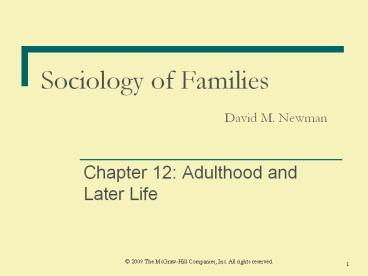chp12 PowerPoint PPT Presentation
Title: chp12
1
Sociology of Families David M. Newman
- Chapter 12 Adulthood and Later Life
2
The Transition To Adulthood
- Defining Adulthood
- Delayed Adulthood
- Emptying the Nest
3
Defining Adulthood
- Different opinions on when someone is an adult
- Twenty-sixth amendment (1971)
- Cultural ideas about appropriate living
arrangements
4
Cultural Attitudes About Living Apart From
In-Laws
5
Delayed Adulthood
- Traditional indicators that someone has become an
adult have become more difficult to attain. - Helicopter parents
6
Emptying the Nest
- Longer life-spans today
- Loss of valuable economic contributions during
nineteenth century - Empty nest syndrome
7
Becoming a Grandparent
- Average age someone becomes a grandparent is 48
- Grandparenting experience is quite diverse
- Effect of divorce
8
Cultural Expectations of Grandparents
- Collectivist cultures
- Individualist cultures
9
Ethnoracial Differences in Grandparenting
- African-American grandmothers
- Important teacher of lessons
- Native American grandparents
- Ensuring cultural integrity of tribe
10
Later Life
- When does a person get old?
- Social and economic resources accumulated during
youth and middle age can shape life during old
age.
11
The Graying of the United States
- 200 years ago the median age was 16, today it is
36.4 - Decrease in number of children born
- Increase in number of people surviving to old age
12
Projected Growth of the U.S. Over-85Population
13
Widowhood
- More widows than widowers
- Peoples response to widowhood is, to some
degree, influenced by perceptions of gender
within the larger culture.
14
Gender and WidowhoodAmong People Age 65 and
Older
15
Culture and the Elderly
- The Elderly in Immigrant Families
- Culture and Old Age in the United States
16
The Elderly in Immigrant Families
- Financial uncertainties
- Cultural contradictions
- Changing elder roles
- Language barriers
17
Culture and Old Age in the United States
- Ageism
- Social Security
- Medicare
- Medicaid
18
The Elderly in Japan
- Otoshiyori
- Close to 50 of Japanese men over 65 are in the
paid labor force - Japanese society is vertically structured
19
Intergenerational Obligations
- Elder Care
- intimacy from a distance has persisted since
the earliest days of the country - Today nearly 80 of people between the ages of 45
and 55 provide some sort of caregiving services
to their parents
20
Intergenerational Obligations
- Gender and Elder Care
- Adult daughters more likely to act on
responsibilities - Obligations met at the expense of other family
roles - Though has little effect on caregivers well-being

